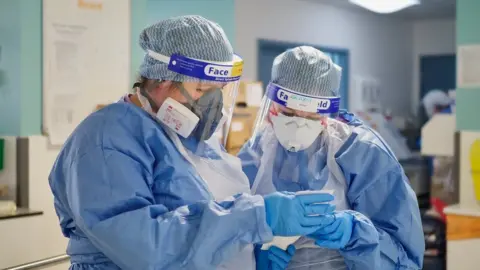Covid: Rise in number of patients in intensive care in Wales
 Nick Mason
Nick MasonThe number of patients being treated for Covid-19 on ventilated beds or in critical care in Wales is at its highest point since early July.
There were 18 critically ill people with confirmed or suspected coronavirus on Tuesday, according to latest weekly figures from NHS Wales.
Seven of these were in Cwm Taf Morgannwg health board, four in Betsi Cadwaladr and three in Aneurin Bevan.
But hospital admissions are slightly down on the week before.
The figures also show there were 343 coronavirus-related patients in hospital beds - 77 more than the week before.
NHS Wales says this is still around a third of the number during the pandemic's peak, when 1,347 patients were in hospital with Covid-19.
Of those in hospital on Tuesday, 89 were confirmed Covid-19 patients, 211 were suspected and 43 were recovering from the virus.
Betsi Cadwaladr - Wales' biggest health board - has 112 in hospitals, followed by Cwm Taf Morgannwg on 83, which is treating its highest number of Covid-19 patients since mid-June.
The seven-day average in total daily admissions to hospitals of confirmed and suspected Covid-19 cases is currently 45, slightly down on the previous week - and this included a weekly fall in Cwm Taf Morgannwg.
NHS Wales said the figure fluctuates but is lower than in late May.
The 18 patients in intensive care or on ventilated beds on 22 September was three times as many as the week before and the highest number since 2 July.
At the peak in April, there were more than 160 critically ill patients across Wales with Covid-19.
Paul Mears, chief executive at Cwm Taf Morgannwg health board, said: "We're just starting to see a slight rise in people coming into hospital - it's not anywhere near what we were seeing earlier but it's the lag you'd expect to see between the community infection rate rising and that playing through into hospitals."
He said staff were keeping a watching brief, but the number in intensive care was in single figures.
Matt Morgan, consultant in intensive care and researcher at the University Hospital of Wales in Cardiff told BBC Radio Wales: "We know that infections are rising but we also know that there are now people in hospitals throughout Wales with Covid.
"That's also rising - nowhere near where it was at the peak - but absolutely rising. The same goes for intensive care across Wales.
"It's not anywhere near the peak but we know those very ill people can take weeks after infection to become that ill."
"It's important to remember even those people who are the most critically ill with Covid, around six out of 10 will survive.
"But it's not only those numbers we see on the news, those who've sadly died, but those who survive sadly have a burden to carry, ongoing."
Dr Morgan said staff were trained and hospitals set up for any second wave, although capacity was important.
Doctors also knew a lot more about the disease now and had treatments which worked and could prevent the need of ventilators and improve chances of survival.
But he said the public had a "massive role" to play to help prevent the virus spreading by keeping to restrictions.
Meanwhile, Mr Mears said there had been no more Covid-19 infections from within the Royal Glamorgan Hospital.
It was revealed on Wednesday that two wards were closed because of 34 Covid-19 cases attributed to infection inside the hospital.
"In the last week, we haven't seen any further escalation in that number which would indicate we're containing that particular cluster - but we're monitoring on a daily basis," he said.
